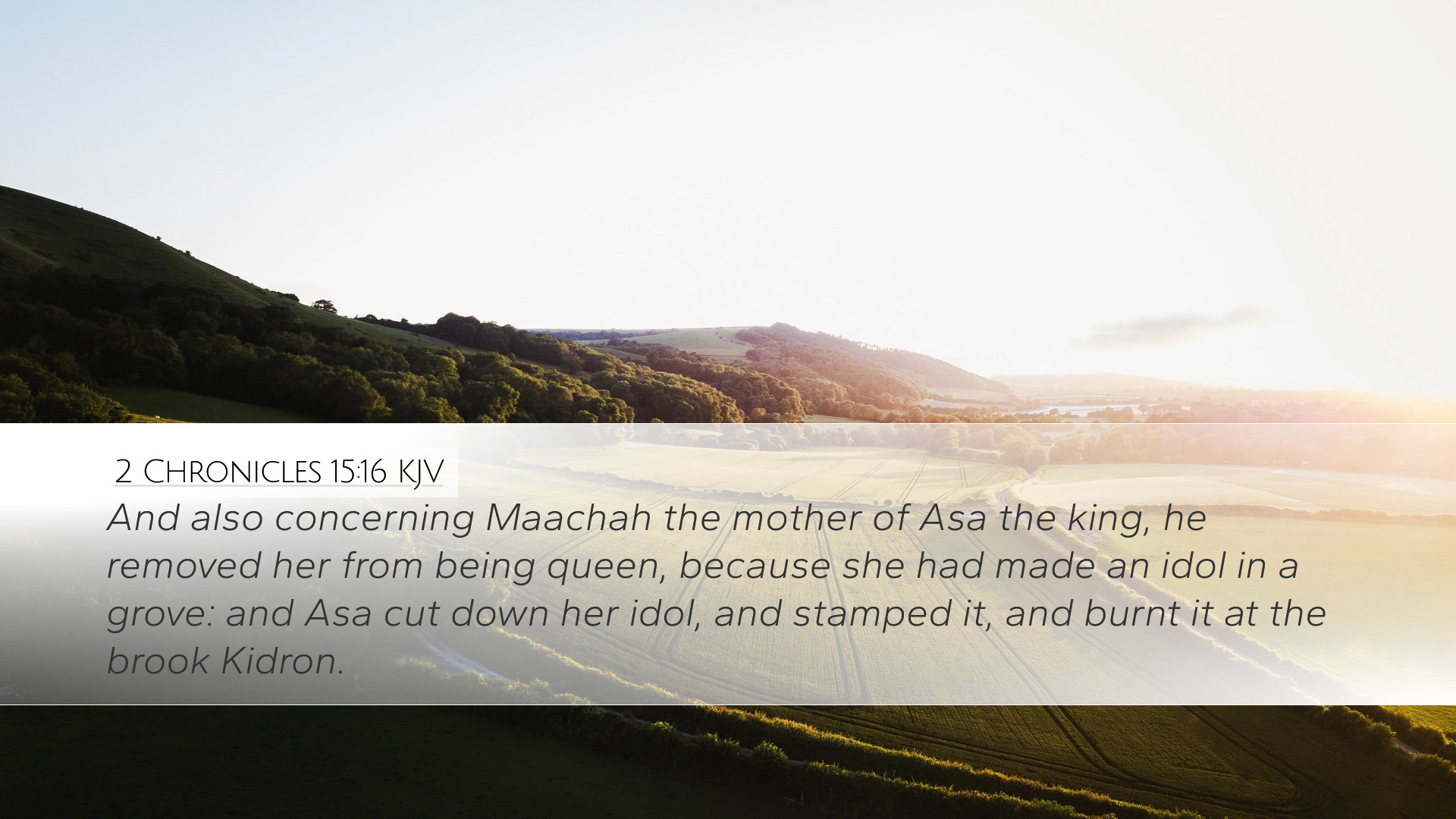Commentary on 2 Chronicles 15:16
2 Chronicles 15:16 states: "And also concerning Maachah the mother of Asa the king, he removed her from being queen, because she had made an idol in a grove: and Asa cut down her idol, and stamped it, and burned it at the brook Kidron."
Contextual Overview
This verse is positioned within a narrative that reflects the reforms instituted by King Asa of Judah. Asa’s reign is characterized by his commitment to the worship of Yahweh and a determination to eradicate idolatry from his kingdom. This verse highlights a poignant moment in Asa's reign where he does not exempt even his own mother from his reforms.
Analysis of Key Themes
- Authority and Accountability: Asa's action regarding his mother signifies a profound understanding of the authority vested in him as king. He recognizes that no familial ties can override the covenantal obligation to worship Yahweh in purity. Matthew Henry notes, "Asa shows that he preferred God's honor before his own interest or affection."
- Idolatry and Its Implications: The reference to Maachah and the idol emphasizes the pervasive nature of idolatry in Israel and Judah. Adam Clarke elaborates that the "idol in a grove" refers to cultic practices that were deeply entrenched in the region. The seriousness with which Asa approaches idolatry serves as a lesson for both ancient and modern believers on the dangers of allowing familial relationships to cloud one's commitment to God.
- Reformation and Resistance: Asa’s reformist zeal is made evident not only by his willingness to act against his mother but also in the symbolic acts of cutting down and burning the idol. Albert Barnes interprets these actions as both a physical and spiritual rejection of idolatry, reinforcing the necessity for leaders to confront sin decisively.
Theological Insights
The verse underscores several theological principles that bear significance for contemporary readers:
- Divine Sovereignty: God’s authority supersedes all other claims to loyalty, including familial ties. The removal of Maachah as queen indicates that all must answer to the king of kings.
- Holiness of Worship: The removal of the idol reflects God's demand for purity in worship. Asa’s actions signify the necessary purging of sin to maintain covenant fidelity.
- Leadership and Integrity: Asa exemplifies a leader driven by integrity, prioritizing national obedience to God above personal sentiment. His actions challenge leaders today to act in accordance with God’s commands, even in difficult circumstances.
Practical Application
The implications of 2 Chronicles 15:16 extend beyond the historical account of King Asa. Here are several applications for modern believers:
- Prioritizing God Over Relationships: Just as Asa prioritized God’s standards over his mother’s influence, believers today are called to maintain their commitment to God above all earthly ties.
- Confronting Idolatry: Idolatry is not merely an ancient issue; today’s idols may manifest in materialism, relationships, or ambitions. Believers must be vigilant in identifying and confronting these idols.
- Embracing Reformation: The term ‘reformation’ signifies both personal and communal transformation. Christians are encouraged to pursue a life that embraces gospel reformation, thereby impacting their communities positively.
Conclusion
2 Chronicles 15:16, whilst specific to the narrative of King Asa, evokes universal truths about faithfulness, the necessity of reform, and the primacy of God's authority in all areas of life. For pastors, students, and theologians alike, the passage serves as a compelling reminder of the calls to integrity and purity in faith and practice.


